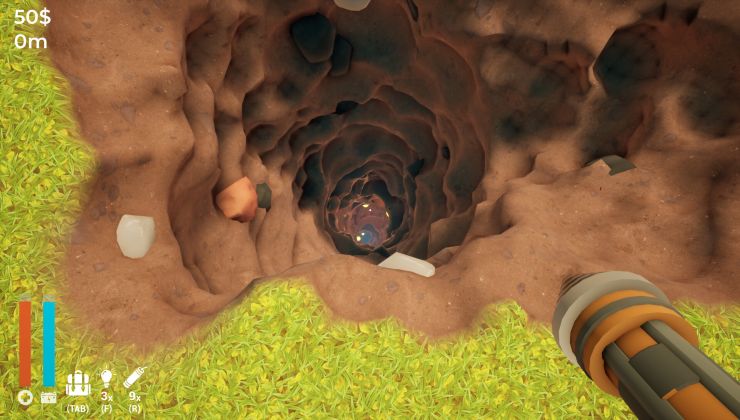Well this was very much expected wasn't it? A judge has ruled in the case of Wolfire versus Valve to dismiss the case.
As a brief reminder of what's been going on - Wolfire Games took Valve to court over a couple of things like: the 30% cut Valve take, and an apparent clause that forces developers match their prices on Steam to other stores if they release their game elsewhere. Valve of course moved to have it dismissed and now a ruling has been passed down.
In the new filing on November 19, the judge has dismissed and denied the case in part, giving Wolfire leave to amend their case, which going by the documentation Wolfire requested and it has been granted, so we might see Wolfire back again with an amended case at some point (they have 30 days).
Going over why it was dismissed, the ruling makes it pretty clear, mentioning that Valve's store fees have remained a constant, even with competition and even when they weren't the "dominant" force in the market. It additionally mentions an older case with Sommers v. Apple, where Apple had a 99 cent music download fee:
"There, as here, the price remained the same throughout, even during periods of intense competition in the marketplace."
It also notes that other stores have charged less than Valve and failed:
"The market reality, at least as plead in the CAC, is that, in spite of Defendant’s 'supracompetitive' fee, others who charge less have failed, even though they had significant resources at their disposal."
When looking to the footer notes, the filing brings up the "substantial" consumer base on Steam and favoured features on Steam, noting the backlash that generates when a developer chooses to release elsewhere and not on Steam. It wasn't named directly but they're hinting at things like the Epic Store here, which is interesting to see it used like this, so it's actually clearly helped Valve's defence here. Competition is good, obviously.
On the subject of the apparent most favoured nation clause, which is what Wolfire claimed Valve used to force prices to remain the same on Steam as other stores, the documents state the complaint lacks the allegations to actually back it up. Not only that but this too:
"If anything, the facts provided by the CAC, at least with respect to output, suggest the opposite—a consistent increase in the number of games available in the market and on the Steam Platform."
So yes, that was to be expected.
30% cut is and remains too much for what little work Valve has "per unit sold"/per game hosted and for most devs not using what "additional value services" Valve provides, but probably just something devs will have to arrange themselves with - or keep out of Steam, which some successfully do.
About the clause, well that's just weird. Why even make a claim like that if you can't back it up?
Last edited by TheSHEEEP on 20 Nov 2021 at 1:26 pm UTC
I am not saying that Valve is some sort of altruistic charity, they are still a for-profit business. But it's not like they are sitting on their pile of money either.
Also, as a Linux user, I don't buy games that do not run on my system. Windows only games that run through proton are therefore sales that wouldn't have happened without Valve's work. Keeping 70% vs. no sale at all sounds like a good deal to me.
It's easy to judge the 30% cut as "too much", but maintaining all the infrastructure is not free.I actually work in this field and no, it isn't free. But you don't need 30% for that. Not even remotely.
15% would be much closer to cover maintenance and still have a small profit.
Also Valve is financing a lot of development work in the Linux world: Mesa, Proton, kernel drivers, etc., which benefits people who don't even use Steam.This is not an argument about if they are making good use of their income, I'd say they do.
It's an argument about if developers should be the ones to pay for all of Valve's extracurricular efforts.
As a developer, if I sell something on a storefront, I'm fine paying the maintenance cost of what I actually use and a bit extra for the storefront's profit - but anything beyond that I'd not be okay with.
It's perfectly fine to like or dislike the 30%, but imo there's no legal grounds to sue over it.That's probably true.
As long as most are willing to pay the cut, it won't change.
It's an argument about if developers should be the ones to pay for all of Valve's extracurricular efforts.Developers aren't paying for anything, customers are. The $100 that developers pay is minimalistic gatekeeping, it doesn't fund anything. If developers don't want to make use of the benefits that Valve provides they can always just use Itch and take up to 100% of the money that customers pay.
The $100 that developers pay is minimalistic gatekeeping, it doesn't fund anything.
The $100 go to charity.
Developers aren't paying for anything, customers are.That's semantics, really.
I'd say customers give 100% of the money to the developers, which have to forward 30% of it to Valve. Or customers give 100% to Valve, which withhold 30% from the developer - that's probably more correct.
Either way, developers lose 30% of what the customers were paying for their game. The developers are the ones losing more money in that scenario than they should.
Keep in mind that taxes go on top of that, in the EU that's about 20% gone additionally (unless you add 20% to the price in VAT countries, which I don't think anyone really does).
So from the get-go you lose 50% of value. Ouch. I'd be pissed about that, too.
Did Valve develop or market that game? No. They host its data and provide some (good) service around it - which is fair to compensate, of course, but 1/3rd is excessive. 1/4th or 5th would be much more reasonable, you don't have to do the lowballing that Epic does to just cover the expenses (of the hosting/service).
Last edited by TheSHEEEP on 20 Nov 2021 at 5:02 pm UTC
Did Valve develop or market that game? No. They host its data and provide some (good) service around itThey provide quite a lot of marketing, actually. But it's simple: if you don't feel that Steam provides sufficient value, don't put your game on Steam. If all you want is packaging and distribution, use Itch; they are amazing at that.
Imagine if they charged like AWS does, based on bandwidth used. Popular games would skyrocket in price. But at least maybe we'd stop having games that were 100GB in size...It's easy to judge the 30% cut as "too much", but maintaining all the infrastructure is not free.I actually work in this field and no, it isn't free. But you don't need 30% for that. Not even remotely.
15% would be much closer to cover maintenance and still have a small profit.
Also Valve is financing a lot of development work in the Linux world: Mesa, Proton, kernel drivers, etc., which benefits people who don't even use Steam.This is not an argument about if they are making good use of their income, I'd say they do.
It's an argument about if developers should be the ones to pay for all of Valve's extracurricular efforts.
As a developer, if I sell something on a storefront, I'm fine paying the maintenance cost of what I actually use and a bit extra for the storefront's profit - but anything beyond that I'd not be okay with.
It's perfectly fine to like or dislike the 30%, but imo there's no legal grounds to sue over it.That's probably true.
As long as most are willing to pay the cut, it won't change.
Valve don't really provide marketing
Well, there are the [Steam Next](https://store.steampowered.com/sale/nextfest) festivals that they do regularly.
The 30% is perfectly justified if you're thinking in pure capitalist terms where whatever people are willing to pay is an OK price. Clearly the network effect of Steam's customer base make it absolutely a poor choice for most game companies, ones without huge amounts of independent marketing muscle, to avoid Steam. Generally, people are going to make more money paying Steam 30% than they will avoiding Steam and not paying 30%.
But "what the traffic will bear" is not the only way of thinking about what kind of price is appropriate. As an extreme case, people often get quite annoyed when pharmaceutical companies suddenly jack the price of lifesaving medicines up by 10 times. They're still going to pay, because how much is your life worth to you? So in the sense that Steam's 30% is by definition fair, so are skyrocketing prices for lifesaving medicines, or for bottled water during a natural disaster. But we tend to think there has to be more to fairness than that.
The 30% is quite likely not justified if you think about Steam like a traditional utility--traditionally, private electric utilities and such have often been regulated to allow them a price that returns the cost of production plus some modest profit, to avoid letting them put the citizens over a barrel with their monopoly power. This has generally worked less well than having public utilities in the first place, but a lot better than having deregulated utilities, which generally lead to skyrocketing prices and supply problems. It may well be that a traditional utility regulator considering Steam as a utility would, upon investigation, find that their profit margin was way too high and they should be regulated to keep it down.
I feel like the people saying the 30% is totes justified have mostly been basing it on the first rationale, where since developers get more from paying the 30% than they would from not paying it, 30% would be justified even if Valve's expenses were zero and their profit margin infinite. And the people saying it isn't have been coming from more of a utility regulator perspective where there is a reasonable level of profit and exceeding it is unfair and bad for broader society. The two are not going to be able to have a reasonable conversation without getting at that difference in their theoretical basis for what's OK.
Mind you, I'd say that Valve has been a lot more responsible with their market power than most deregulated utilities, let alone pharmaceutical companies. Maybe because there is more potential for meaningful competition, maybe because what they're providing isn't a necessity so there are more meaningful limits to what the traffic will bear, maybe just because they're nicer folks.
Last edited by Purple Library Guy on 20 Nov 2021 at 8:54 pm UTC
Valve don't really provide marketingThey have millions of pairs of eyeballs they can put your game in front of, and they've invested heavily in putting it in front of the eyeballs of customers that are likely to buy your game, as well as providing detailed sales data about which regions are interested in your game and when interest is generated. If you have a better term for that than "marketing," please share.
The 30% is quite likely not justified if you think about Steam like a traditional utilityWhy?
There was an analysis I read relatively recently, based on the figures released through the Epic vs Apple trial (I'll include the link if I happen to find it again) that had Valve's break-even point at around a 20% cut, and GOG's at around 25%. Valve's cut is 20-30%, depending on your sales, and they provide a whole lot in exchange. You can get similar services (although arguably not as good) from Sony - who take 30% or Microsoft (again, arguably not as good) - who take 30%. And Valve have invested the money that they've made into the PC gaming ecosystem. Would there be as much money made by developers as easily now if there had been only GameSpy working on only cost-covering margins since 2003?
The only argument ever presented is that developers want more money. And they'll always want more money, whatever the level were set at.
They have millions of pairs of eyeballs they can put your game in front of, and they've invested heavily in putting it in front of the eyeballs of customers that are likely to buy your game, as well as providing detailed sales data about which regions are interested in your game and when interest is generated. If you have a better term for that than "marketing," please share.That's not marketing, they do none of that for particular games (except their own).
That's just a storefront with useful filtering and suggestion mechanisms, and "ad space" to somehow deal with the flood of games.
And still good games often get drowned out - don't think Valve is to blame for this all that much, but just having a platform with reach and making it comparatively useful to browse is not marketing.
Valve don't do any marketing for games, they only offer a platform for devs & publishers to do it.
Let me see Valve hire some PR people and "community managers" to go into target-audience-relevant communities/contact streamers/etc. for one of the games that pay them a 30% cut and then we can talk about "marketing".
Hell, if they do that, let em ask for 40%!
You can get similar services (although arguably not as good) from Sony - who take 30% or Microsoft (again, arguably not as good) - who take 30%. And Valve have invested the money that they've made into the PC gaming ecosystem. Would there be as much money made by developers as easily now if there had been only GameSpy working on only cost-covering margins since 2003?You are again arguing the strawman that Valve makes better use of their excessive cuts than others do.
How nice. Not the point, not argued against by anyone. Stop it.
The only argument ever presented is that developers want more money. And they'll always want more money, whatever the level were set at.No, the argument is that developers deserve more money from their sales.
They are the ones creating the game, in case you forgot about that. They are the ones gamers should want to benefit as much as possible from their money.
Valve just offers the platform to sell them on - Steam is replaceable (in case competitors ever get their shit together... it's a cosmic joke that so far they don't), the games are not.
To quell the fanboy rage a bit, this is not an attack on Valve, Valve do good. But it is a fact nonetheless.
Last edited by TheSHEEEP on 20 Nov 2021 at 9:49 pm UTC
I don't think there is anything wrong with taking 30%. They don't have a monopoly, so they can set the prices and if you don't like them you can still use gog, itch or your own launcher. Ubisoft, League of Legends, Overwatch, Fortnite,... seem all to do fine without steam.
Also, as a Linux user, I don't buy games that do not run on my system. Windows only games that run through proton are therefore sales that wouldn't have happened without Valve's work. Keeping 70% vs. no sale at all sounds like a good deal to me.
that is non sense.
linux has 1% of marketshare.
valve takes 30% of all the sames on a platform with 90% of marketshare.
if you earn 900.000 dollars with an game and valve takes 30%, you end up with 630.000 dollars.
then you sell more 1% wich give you aditionally 9.000 dolars, and out of those valve take 30% and you end up with 6300 extra dolars thanks to valve making your game avaliable for linux.
you dont have to be a genious to realize that if valve changed their cut to 20% instead, you would end up with 90.000 more instead of 6300.
now, i know that some indie games were ported to linux in the 5 first humble bundles and 20% of their income came from linux users, but back then, there were almost no games avaliable for linux, so the lack of competition was the main reason for those extra sales, nowadays that there are plenty of games for linux, linux is just 1~4% of the sales of an game, and with proton, pretty much the entire library works on it, so its just 1% more.
so the only big thing that valve is doing to make an difference is steamdeck, that might be a game changer for sales, or not.
now, dont get me wrong, i apreciate what valve is doing for us, but the same can be said about any company, as much as i despise microsoft for being an monopoly on pc, if they werent arround maybe all the big games would be console exclusives nowadays, and consoles would be even worse than they are without an xbox competing on it.
I don't see a problem with valves fee, if you don't like it you don't have to release on Steam.As others have pointed out, that's not a choice that especially small devs have.
Many gamers quite simply demand a Steam release or they won't buy a game. So, what choice does a developer have here, really?
Lose more money than you should on a sale or lose the entire sale. Hmm...
Big names can somewhat pull that off.
Small devs? I could maybe name a handful that have successfully sold a game outside of Steam.
Last edited by TheSHEEEP on 20 Nov 2021 at 9:54 pm UTC
Developers aren't paying for anything, customers are.That's semantics, really.
I'd say customers give 100% of the money to the developers, which have to forward 30% of it to Valve. Or customers give 100% to Valve, which withhold 30% from the developer - that's probably more correct.
Either way, developers lose 30% of what the customers were paying for their game. The developers are the ones losing more money in that scenario than they should.
Keep in mind that taxes go on top of that, in the EU that's about 20% gone additionally (unless you add 20% to the price in VAT countries, which I don't think anyone really does).
So from the get-go you lose 50% of value. Ouch. I'd be pissed about that, too.
Did Valve develop or market that game? No. They host its data and provide some (good) service around it - which is fair to compensate, of course, but 1/3rd is excessive. 1/4th or 5th would be much more reasonable, you don't have to do the lowballing that Epic does to just cover the expenses (of the hosting/service).
companies pay 20% of taxes, but they pay 20% on top of their income, not on top of the gross revenue.
in other words, if consummers pay valve 1 million for your game, you earn 700.000 from those 1 million, and pay 20% from those 700.000 as taxes, not 20% from the original 1 million.
valve has to pay their taxes too, but you wont see your money disapearing twice for that reason.
another thing to consider is game engine taxes, for instance, if you make your game using unreal, in that scenario, you also pay another 5% to epic, unless you relased your game in EGS, in that case they cut the engine royalites to 0, and their own royalites is 12%.
keep in mind that you pay 5% of gross revenue, in other words, from those 1 million that valve earned!
or at least, that is what i understood the last time i checked (but i might be confounding it with unity)










 How to set, change and reset your SteamOS / Steam Deck desktop sudo password
How to set, change and reset your SteamOS / Steam Deck desktop sudo password How to set up Decky Loader on Steam Deck / SteamOS for easy plugins
How to set up Decky Loader on Steam Deck / SteamOS for easy plugins
See more from me